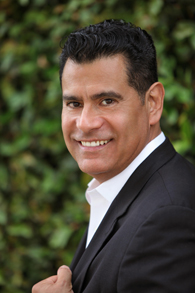Fulbright-García Robles Fellowship 2015-2016 Disclosures of Violence from the Other Mexico
September 26, 2016

By
Rafael Luévano
Associate Professor
Department of Religious Studies
Fulbright awards are offered to scholars, businesspersons, artists, and students to travel to foreign countries to establish cooperative working relationships and promote mutual understanding between peoples and nations. For the 2015–2016 academic year, I was awarded the Fulbright-García Robles Fellowship for my travel to, and research in Mexico at the Jesuit Universidad Iberoamericana de Ciudad Mexico.
During my nine-month-long academic fellowship, I cultivated professional and personal relationships that will endure a lifetime and will serve as a means of ongoing interchange for cooperative academic work—and I believe shared understanding—in Latin America.
My interdisciplinary fellowship project proposal concerned a theological notion of the “spiritual memory” of the more than 127,000 dead and 27,000 missing in Mexico since 2006 as a result of violence related to the illegal narcotics trade. Essential to this project was field research that included interviews with multiple victims of narco-related violence as well as with leading politicians, religious and business leaders, journalists, and artists.
I comment on only one of the most telling series of these interviews. On September 26, 2014, in Iguala, Guerrero State, Mexico, police, the army, and local narcos staged a massive attack on Ayotzinapa students; the police abducted 43 of them. This event confirmed most Mexicans’ commonly held suspicion of collusion between the highest level of government and the illegal narco trade. The devastating Ayotzinapa student attack also tore open the memory of the 1968 Tlatelolco student massacre that occurred just days prior to Mexico hosting the 1968 Olympics. This event remains one of the nation’s most shameful and unhealed wounds. I conducted extensive interviews with parents of the Ayotzinapa missing students along with students who miraculously escaped death that fateful night. I also interviewed survivors of the 1968 Tlatelolco student massacre. Though separated by nearly 50 years the collective testimonies of these survivors from both events offer acute insight into the nature of memory and violence in Mexico.
In these interviews I was struck by survivors’ recollections that differed from my originally proposed notion of “spiritual memory.” Thus my theological focus shifted to the employment of Mexican poet, diplomat, and Nobel Laureate Octavio Paz’s understanding of “the Other Mexico.”
Paz conceived this notion to explain the 1968 Tlatelolco student massacre. The concept of “the Other Mexico” departs from the North American sociopolitical presupposition. Instead Paz advanced the idea of an indefinable realm of “a subterranean or invisible history of Mexico.” With this unique Mexican lens, Paz offered probing and fresh understanding into Mexico’s national identity and particularly its relationship to violence.
In my present book in progress, titled “Disclosures of Violence from the Other Mexico,” I apply Paz’s notion to probe hotbeds of narco bloodshed that scourge Mexico. I hope that my work contributes to the international discussion that seeks concrete responses to narco-related violence and its consequences on both sides of the Rio Grande.

